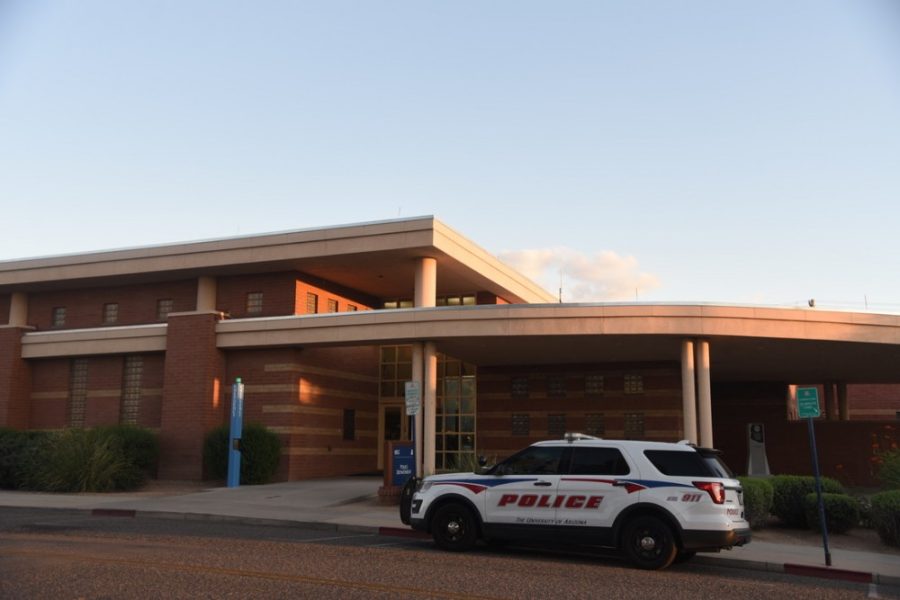Over 800 people recently signed a petition to downsize the University of Arizona Police Department, nearing the goal of 1,000 signatures. Following nationwide protests addressing police brutality and systemic racism over the last month, dialogue has started on campus examining reform of the university’s policing body.
Last week, UA’s Coalition of Black Students and Allies sent a list of demands to university administration, including a 30% reallocation of funding from UAPD’s $5.8 million annual budget, severance of connections with Tucson Police Department, U.S. Customs and Border Patrol, state and city authorities and a relocation of funds to cultural resources on campus.
Attention has been brought to UAPD’s history of discrimination of black students, including failure to act on the assault of a black student in September 2019, lack of action in regard to racial slurs made by Arizona sorority member in May and the intimidation of UAPD, clad in riot gear and heavy arms, on organizers of a “Celebration of Black Lives” event on June 6.
UA mathematics student Finlay Parsons, the author of the petition, hopes to see real change come out his document and the recent dialogue made by COBA.
“I see (the petition) serving as a piece of evidence that there is actually significant student support for UAPD reform,” Parsons said in a Zoom interview with the Daily Wildcat.
In his petition, Parsons highlighted a demand also made by COBA; a reallocation of funding from UAPD to a student resource many believe underfunded — campus mental health services. Parsons’ and COBA’s point being that more funding of cultural or mental health resources on campus will reduce the need for UAPD policing.
“The increase of resources to CAPS and other services from the police, will mean that students who are struggling, the students who UAPD already tends to police more often, are going to have an easier time on campus because they have access to all these resources,” Parsons said. “With more of these resources, there will be less of a need for UAPD anyway.”
While many call for outright abolishment of police forces, Parsons instead wants to see a change in campus policy priorities to a focus on community assistance instead of forceful punishment.
“I think part of this movement now is saying, ‘Hey, let’s not make it about how we can punish people further, or make it worse for people doling bad things, but instead look at why people are doing these things,'” Parsons said. “The goal is that we want resources in place so that people don’t commit crimes in the first place,.”
A large part of COBA and Parsons’ goals are to defund and deconstruct an organization that they believe endangers black and brown students.
“The policing from an institutional level is not only contributing to the anti-Blackness of the University’s values but perpetuating the concept that Black spaces created by Black people are inherently violent and need policing,” COBA said in their list of demands.
Without such a bolstered police presence, spaces on campus may be more welcoming and safer for Black and brown students — many of whom remain fearful after encounters with UAPD, TPD and CBP authorities on campus.
“The administration has not done all they can to create an inclusive atmosphere on campus, especially for black students,” Parsons said. “When a Black student gets called a racial slur on campus, there is nothing UAPD does then. Or there was that incident where a black student got assaulted. UAPD didn’t do anything to stop that. What UAPD does is instead punish people for drug use, which does not help the community. Part of our goal is to make sure students of color will feel more included and less threatened on campus, or in certain spaces without such a heavy police presence.”
COBA, following similar moves made by students and administration on the University of Minnesota’s campus in Minneapolis, want to see all ties with TPD, city, federal and state authorities cut. Many students remember feeling intimidated by CBP presence during Spring Career Days in March of 2019, and during TPD and U.S. Immigration and Customs Enforcement apprehension of a migrant family just a few miles near campus.
RELATED: Arizona Athletics pauses student-athlete reentry plan after rising number of cases in Pima County
To Parsons, even if TPD is known as one of the more progressive police departments in the country, the goals and presence of all local state and federal police agencies on campus are still enough to make campus students and staff feel intimidated.
“Tucson PD is relatively one of the more progressive police forces,” Parsons said. “People will say look at TPD and it’s not that bad, but the point is that TPD are still police, and their job is to arrest people and put them into jail.”
The Wildcat reached out to COBA for a statement but has not received a response yet.
Follow Ian Tisdale on Twitter








